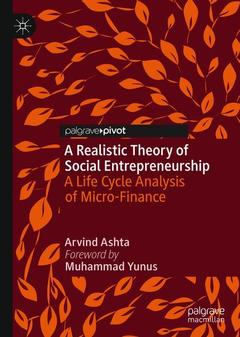A Realistic Theory of Social Entrepreneurship, 1st ed. 2020 A Life Cycle Analysis of Micro-Finance
Auteur : Ashta Arvind
Préfacier : Yunus Muhammad

Chapter 1. INTRODUCTION: THE NEED FOR A DYNAMIC THEORY ON SOCIAL ENTREPRENEURSHIP. 1
1.1 The importance of SE research. 1
1.2 The limitations of SE research. 4
1.3 Introducing the life cycle concept. 8
1.4 Microfinance: A leading sector of SE, underrepresented in SE theory. 9
CHAPTER 2: SOCIAL ENTREPRENEURSHIP THEORETICAL WORK HAS BEEN STATIC.. 19
2.1 Level of the social entrepreneur. 20
2.2 Level of the social enterprise. 29
2.3 An application of the Static Version of the Realistic Theory of SE.. 32
CHAPTER 3: DYNAMICS OF A LIFE CYCLE THEORY BASED ON DEVELOPED COUNTRY HISTORIES 41
3.1 A Brief Review of the evolution of the life cycle Theory. 42
3.2 Application of the Life Cycle Theory to Historical Financial Innovations. 45
3.3 Application of the Life Cycle Theory to Ongoing Financial Institutions. 50
CHAPTER 4: EVOLUTION OF DEVELOPING COUNTRY MICROFINANCE AND FINANCIAL INCLUSION.. 58
4.1 The creation of MFIs: the embryonic stage. 60
4.2 The development and diffusion of MFIs. 63
4.3 Transformation of MFIs and the quest for social performance. 67
4.4 A shift in perspective to financial inclusion. 71
CHAPTER 5: EXTENDING THE REALISTIC THEORY TO A DYNAMIC LIFE CYCLE THEORY OF SOCIAL ENTERPRISE.. 82
5.1 The Embryonic stage. 84
5.2 Growth or Transformation from NGO to for-profits. 89
5.3 Shakeout. 95
5.4 Maturity and decline. 97
5.5 Decline. 97
CHAPTER 6: CONCLUDING REMARKS ON SOCIAL ENTREPRENEURSHIP THEORY DEVELOPMENT, TEACHING, AND FUTURE RESEARCH.. 101
6.1 Development of the Realistic Theory of SE.. 102
6.2 Practical considerations for SE training and education. 106
6.3 Limitations. 109
6.4 Future Research directions 111
Date de parution : 11-2019
Ouvrage de 138 p.
14.8x21 cm



